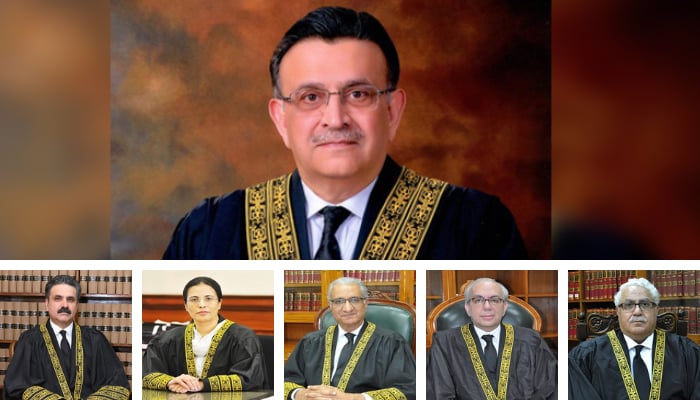ISPR DG said Monday that proceedings against 102 people handed over for trial were underway

CJP Umar Ata Bandial (top) and (left to right) Justice Yahya Afridi, Justice Ayesha Malik, Justice Ijazul Ahsan, Justice Munib Akhtar, and Justice Mazahar Ali Naqvi. — Supreme Court website
ISLAMABAD: No trial of any civilian has commenced in military courts as of yet, Attorney General for Pakistan (AGP) Mansoor Usman Awan informed the Supreme Court Tuesday during the fourth hearing of the petitions filed against the trial of civilians in military courts.
In yesterday's hearing, Chief Justice of Pakistan (CJP) Umar Ata Bandial had asked the AGP to "reassure" him that no such trial would occur as long as the case was being heard in the court.
The AGP had confirmed that no trial of civilians was underway.
However, later in the evening, Inter-Services Public Relations (ISPR) Director General (DG) Major General Ahmed Sharif Chaudhry said that proceedings against the 102 people handed over for trial were already underway.
A six-member larger bench, headed by Chief Justice Umar Ata Bandial and comprising Justice Ijazul Ahsan, Justice Muneeb Akhtar, Justice Yahya Afridi, Justice Ayesha Malik, and Justice Mazahir Ali Naqvi, is hearing the petitions against the government's decision to try civilians in military courts.
The government announced that those involved in the violence that erupted on May 9 — in which several government buildings and army installations were vandalised — would be tried under army laws.
The petitions, separately filed by PTI Chairman Imran Khan, former chief justice Jawwad S Khawaja, legal expert Aitzaz Ahsan, and five civil society members, including Piler Executive Director Karamat Ali, have requested the apex court to declare the military trials unconstitutional.
During the previous hearings, ex-CJP's lawyer Khawaja Ahmed Hussain, petitioner Aitzaz Ahsan's counsel Latif Khosa, and civil society lawyers Faisal Siddiqui and Salman Akram Raja completed their arguments.
'Conflicting statement'
After the AGP's clarification, the PTI chief's counsel took to the rostrum at the start of the hearing and said that the AGP and the ISPR DG had conflicting statements.
"A press conference was held by ISPR DG yesterday in which he talked about the trial of 102 people. The Attorney General and ISPR DG have conflicting statements," he said.
To this, the AGP responded: "I stand by my statement even today."
He added that the representatives of the Ministry of Defence were present in the court and could explain the situation better.
At this, Justice Ayesha observed: "We are currently reviewing existing judicial precedents."
Moreover, the CJP expressed faith in the AGP's statement, directing the court's attention to the matter at hand.
'Can civilians be tried under Army Act?'
Lawyer Bhandri then resumed his arguments pertaining to the case, contending that civilians cannot be tried in military courts.
"I will not talk about the trial of soldiers and the powers of the court," he said.
"However, whether a crime can come under the Army Act or not is a different question," he said, adding that it must be determined whether there can be a trial [of a civilian] in military courts for crimes related to the forces.
Justice Ahsan remarked that Article 175(3) of the appointment of judges came in 1986.
"In comparison to the judicial precedents you are talking about, the circumstances and events are completely different now," he observed.
Justice Munib then asked Bhandari what protection the Constitution gave civilians that military officers did not have.
Bhandari responded that the fundamental rights mentioned in the Constitution do not apply to military personnel and officers.
"My arguments will be against the military trial of civilians only. I have nothing to do with the issue of trial against soldiers," he added.
Bhandari also submitted that Parliament could not allow civilian trials in military courts without a constitutional amendment, adding that in the 21st constitutional amendment, the principle was established that a constitutional amendment is required for trying civilians [under the Army Act].
Justice Ayesha asked: "[But] what if there is an aspect of an internal relationship, then can't the civilian be tried in the military courts?"
Justice Ahsan further observed: "Principles such as threats to war and defense of domestic relations are laid down in the judgment of the 21st Amendment case."











